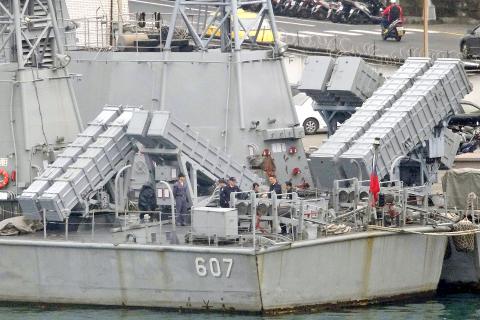Top government officials and military command centers yesterday closely monitored the passage of Chinese aircraft carrier the Liaoning and escort warships as the fleet passed through the Taiwan Strait, sending reports to President Tsai Ing-wen (蔡英文).
The vessels were expected to exit Taiwan’s air defense identification zone after press time last night.
Tsai, who is on a nine-day state visit to Central America, conferred with top military and national security officials on the Liaoning’s passage through the Taiwan Strait, speaking via telephone with National Security Council Deputy Secretary-General Chen Chun-ling (陳俊麟) and Minister of National Defense Feng Shih-kuang (馮世寬) yesterday morning.

Photo: AFP
Presidential Office spokesman Alex Huang (黃重諺) said Tsai made the calls upon her return to her hotel in Managua after attending Nicaraguan President Daniel Ortega’s inauguration ceremony.
“Tsai instructed the council and the Ministry of National Defense to closely monitor developments and to stand by contingency plans to reassure the public that they can relax,” Huang said, adding that the president was satisfied with monitoring and mobilization efforts by the agencies.
Huang said that even before Tsai’s departure, government ministries had activated deployment and contingency plans to enable the comprehensive tracking and surveillance of the fleet’s movement, location and weapons deployment.
Earlier yesterday, ministry officials said the carrier group did not intrude into Taiwan’s territorial waters, but it entered the nation’s air defense identification zone from the southwest, sailing northward, at about 7am.
The Liaoning and its escort vessels kept to the Chinese side, west of the median line of the Taiwan Strait, with passage estimated to take more than 10 hours.
It was expected to leave the zone late last night, ministry spokesman Major General Chen Chung-chi (陳中吉) said.
Defense forces deployed F-16s, Indigenous Defense Fighter jets, P-3C surveillance aircraft and frigates to monitor and track the Chinese warships’ movements.
The Liaoning conducted naval exercises in the South China Sea, with its squadron of 15 Shenyang J-15 aircraft and had seven escort vessels, including three missile cruisers.
A high-ranking military official was quoted in reports as saying that the ministry had contingency plans and was prepared for missile strikes targeting the carrier group if the vessels had crossed the median line, trespassing in Taiwan’s territorial waters.
A combination of Taiwan’s locally developed Hsiung Feng II and Hsiung Feng III missiles, if deployed in successive waves of attacks, could overwhelm the defensive systems of the carrier group, said the official, who declined to be named.
Chang Cheng (張誠), a retired engineer who helped to develop the Hsiung Feng III missiles at the nation’s main defense research center, agreed with the assessment.
“I have no doubt that our Hsiung Feng III missiles could do the job,” Chang said, adding that the supersonic missiles have earned the nickname “aircraft carrier killers” and can reach 2.5 to 3 times the speed of sound.

MORE VISITORS: The Tourism Administration said that it is seeing positive prospects in its efforts to expand the tourism market in North America and Europe Taiwan has been ranked as the cheapest place in the world to travel to this year, based on a list recommended by NerdWallet. The San Francisco-based personal finance company said that Taiwan topped the list of 16 nations it chose for budget travelers because US tourists do not need visas and travelers can easily have a good meal for less than US$10. A bus ride in Taipei costs just under US$0.50, while subway rides start at US$0.60, the firm said, adding that public transportation in Taiwan is easy to navigate. The firm also called Taiwan a “food lover’s paradise,” citing inexpensive breakfast stalls

TRADE: A mandatory declaration of origin for manufactured goods bound for the US is to take effect on May 7 to block China from exploiting Taiwan’s trade channels All products manufactured in Taiwan and exported to the US must include a signed declaration of origin starting on May 7, the Bureau of Foreign Trade announced yesterday. US President Donald Trump on April 2 imposed a 32 percent tariff on imports from Taiwan, but one week later announced a 90-day pause on its implementation. However, a universal 10 percent tariff was immediately applied to most imports from around the world. On April 12, the Trump administration further exempted computers, smartphones and semiconductors from the new tariffs. In response, President William Lai’s (賴清德) administration has introduced a series of countermeasures to support affected

CROSS-STRAIT: The vast majority of Taiwanese support maintaining the ‘status quo,’ while concern is rising about Beijing’s influence operations More than eight out of 10 Taiwanese reject Beijing’s “one country, two systems” framework for cross-strait relations, according to a survey released by the Mainland Affairs Council (MAC) on Thursday. The MAC’s latest quarterly survey found that 84.4 percent of respondents opposed Beijing’s “one country, two systems” formula for handling cross-strait relations — a figure consistent with past polling. Over the past three years, opposition to the framework has remained high, ranging from a low of 83.6 percent in April 2023 to a peak of 89.6 percent in April last year. In the most recent poll, 82.5 percent also rejected China’s

PLUGGING HOLES: The amendments would bring the legislation in line with systems found in other countries such as Japan and the US, Legislator Chen Kuan-ting said Democratic Progressive Party (DPP) Legislator Chen Kuan-ting (陳冠廷) has proposed amending national security legislation amid a spate of espionage cases. Potential gaps in security vetting procedures for personnel with access to sensitive information prompted him to propose the amendments, which would introduce changes to Article 14 of the Classified National Security Information Protection Act (國家機密保護法), Chen said yesterday. The proposal, which aims to enhance interagency vetting procedures and reduce the risk of classified information leaks, would establish a comprehensive security clearance system in Taiwan, he said. The amendment would require character and loyalty checks for civil servants and intelligence personnel prior to